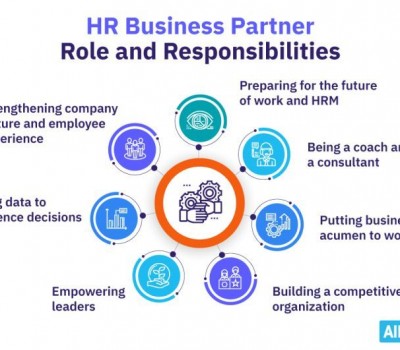HR Business Partner Role
What is an HR Business Partner?
An HR Business Partner (HRBP) is a strategic advisor and consultant within the HR department who works closely with business leaders and managers to align people strategy with the overall business strategy.
Here are the responsibilities of an HR Business Partner:
1. Strategic Planning:
- Collaborate with business leaders to understand organizational goals and develop HR strategies that align with overall business objectives.
- Participate in strategic planning sessions to provide HR insights and expertise.
2. Talent Management:
- Implement talent acquisition strategies, including recruiting, onboarding, and workforce planning.
- Develop and implement retention strategies to ensure the organization retains key talent.
3. Employee Relations:
- Act as a point of contact for employee relations issues, providing guidance and support to managers and employees.
- Investigate and resolve workplace conflicts and disputes.
4. Performance Management:
- Implement and oversee performance management processes, including goal setting, performance reviews, and feedback.
- Work with managers to address performance issues and develop improvement plans.
5. Training and Development:
- Identify training needs within the organization.
- Develop and implement training programs to enhance employee skills and competencies.
6. Change Management:
- Assist in managing organizational change initiatives.
- Support communication efforts related to changes in policies, procedures, or organizational structure.
7. HR Analytics:
- Utilize data and analytics to make informed HR decisions.
- Monitor key HR metrics and use insights to drive continuous improvement.
8. Employee Engagement:
- Implement initiatives to enhance employee engagement and satisfaction.
- Conduct employee surveys and analyze results to identify areas for improvement.
9. Policy Development and Compliance:
- Develop and update HR policies in line with legal requirements and industry best practices.
- Ensure compliance with local, state, and federal employment laws.
10. Collaboration and Communication:
- Foster effective communication between HR and business units.
- Collaborate with other HR professionals to share best practices and align HR strategies across the organization.
11. Succession Planning:
- Work with leadership to identify and develop potential future leaders within the organization.
- Implement succession planning strategies to ensure a pipeline of qualified talent.
HRBPs play a crucial role in driving organizational success by ensuring that HR initiatives support and enhance the overall business strategy.
#hirewithepicareer #hrbp
- Category:
- Arts & Culture
- Writer:
- Nwodi Daniel
- Phone:
- +2348038129790
- 12 Mar, 2024
- 254 views
- No comments






